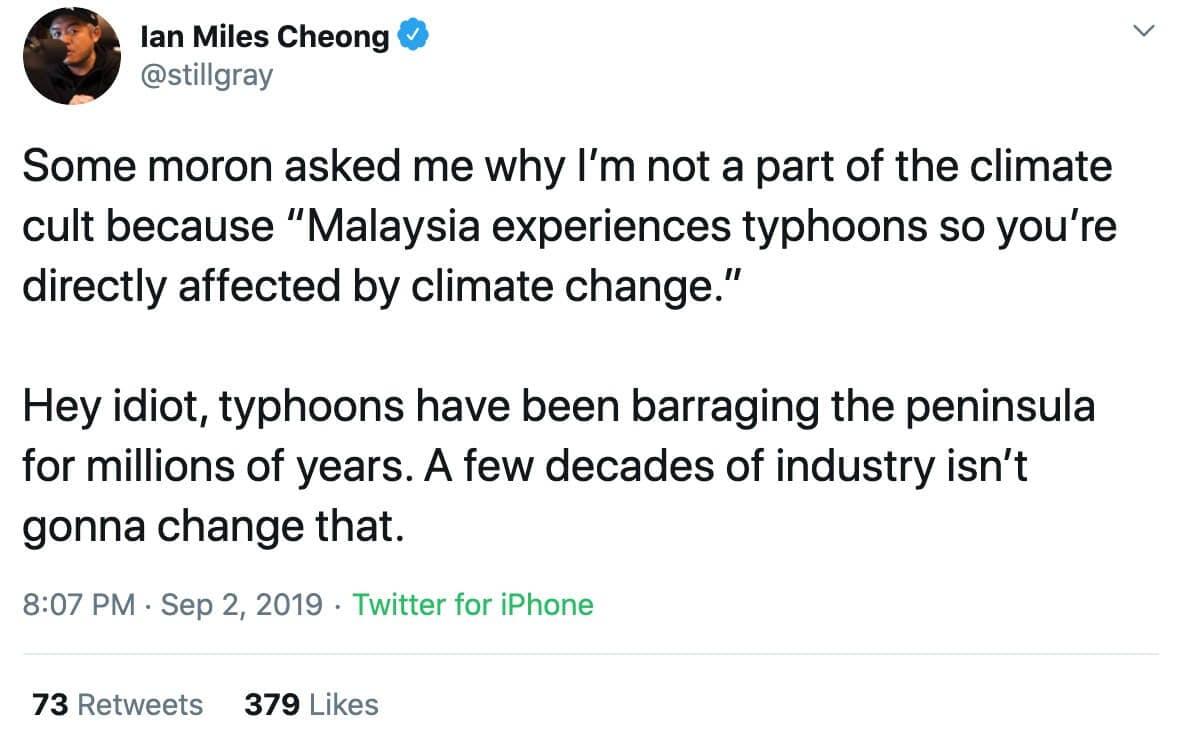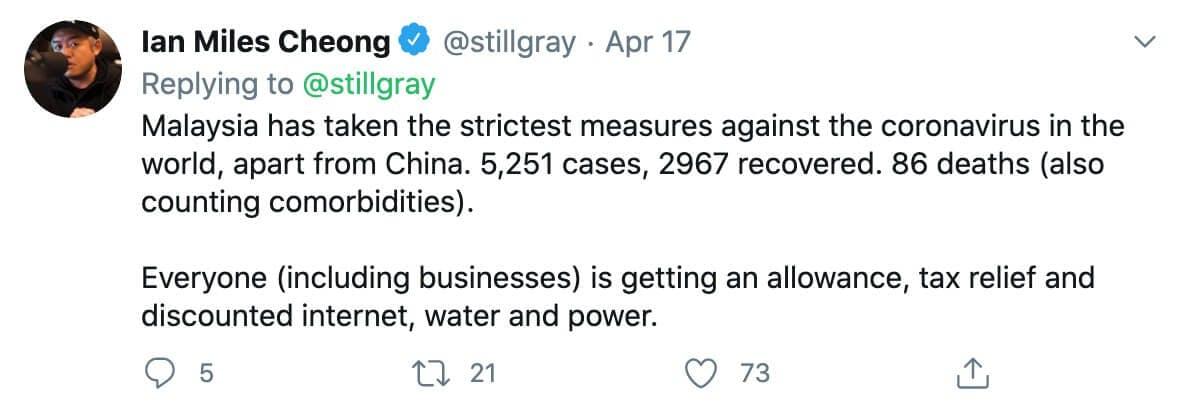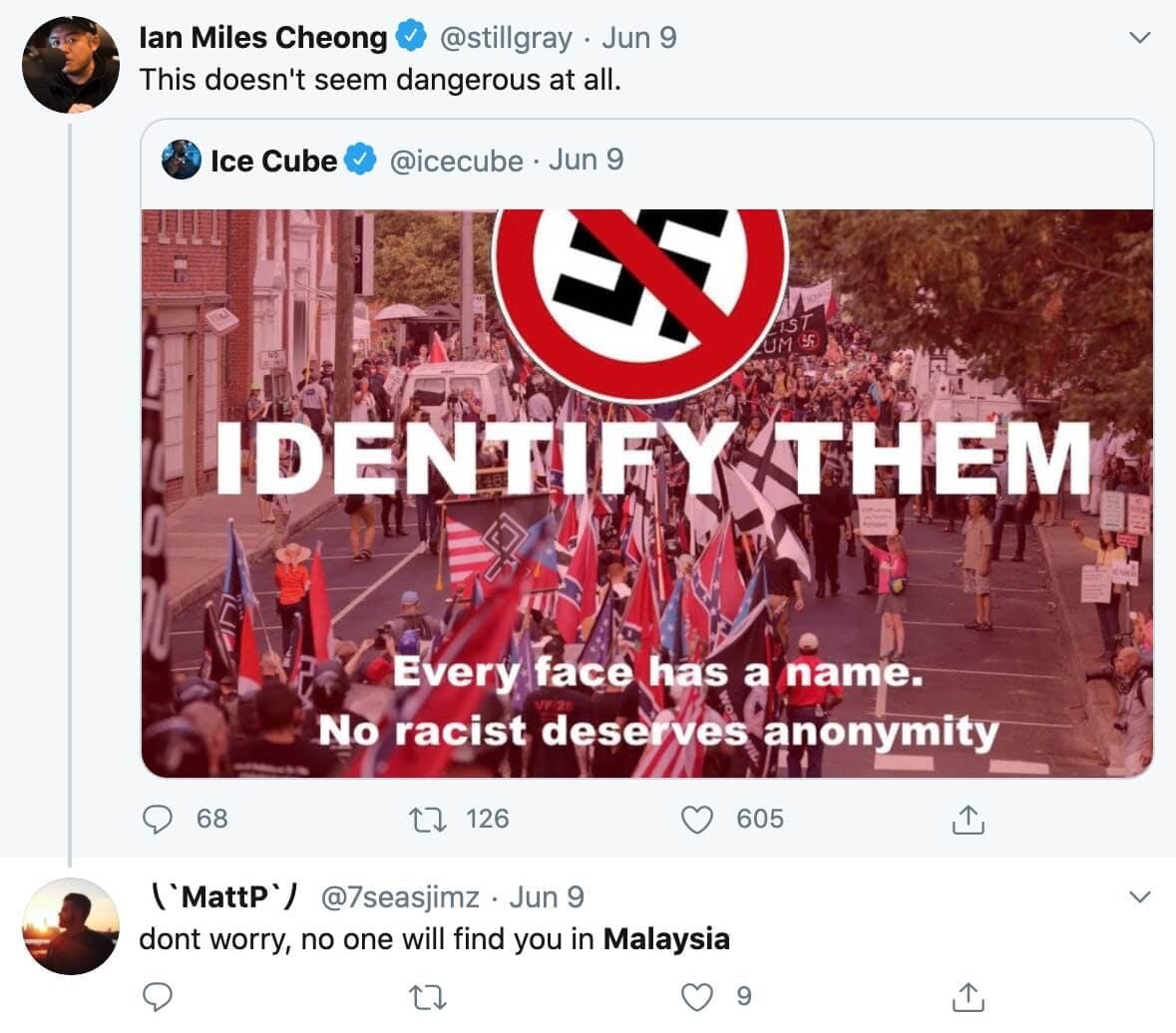A text dump on Ian Miles Cheong
Who is Ian Miles Cheong, and why does the internet care where he lives?
Where does Ian Miles Cheong live?
Who is Ian Miles Cheong, and why does the internet care where he lives?
The replies in nearly every recent tweet of Cheong's are now filled with users telling him to butt out of U.S. politics.
Posted on Jun 17, 2020 Updated on Mar 3, 2021, 1:37 pm CST
Twitter users were shocked to learn this week that Ian Miles Cheong, a prominent pro-Trump conservative, isn’t actually living in America.
Who is Ian Miles Cheong?
Known best for his commentary on Twitter, Cheong has made a name for himself in right-wing circles by frequently weighing in on U.S. politics.
Long before his foray into U.S. domestic issues, Cheong was best know for his work as a gaming journalist and for his role as an influential moderator on Reddit.
Cheong’s is also known for his involvement in Gamergate, a term used to describe a controversy between primarily male gamers and female game developers that led to a widespread harassment campaign in 2014.
Initially, Cheong, who described himself as a “turbo-feminist” at the time, leapt to the defense of the female game developers such as Zoe Quinn. But Cheong’s politics would begin shifting to the far-right as the years went on.
Where does Ian Miles Cheong live?
But Twitter users critical of Cheong began stating online that the pundit lived not in America but on the opposite end of the planet—specifically, the South East Asian country of Malaysia.
“I just learned that Ian Miles Lap Cheong lives in Malaysia??” @_tanwho_ wrote. “I always thought he was American because he spends all of his time licking Yankee boot.”

So is Ian Miles Cheong actually living in Malaysia? It appears so. The conservative has made numerous references to the fact over the years.
Just last year, Cheong referenced living in Malaysia while explaining why he did not believe in climate change.
“Some moron asked me why I’m not a part of the climate cult because ‘Malaysia experiences typhoons so you’re directly affected by climate change,” Cheong said. “Hey idiot, typhoons have been barraging the peninsula for millions of years. A few decades of industry isn’t gonna change that.”

Ian Miles Cheong also tweeted out pictures in April of Malaysia amid the coronavirus lockdown, stating that the images came from “where I’m currently living.”
“Malaysia has taken the strictest measures against the coronavirus in the world, apart from China,” Cheong said at the time. “5,251 cases, 2967 recovered. 86 deaths (also counting comorbidities). Everyone (including businesses) is getting an allowance, tax relief and discounted internet, water and power.”

This week is far from the first time Twitter users have referenced where Cheong is living while pushing back on his political commentary.
A journalist in April pointed to Malaysia while telling Cheong to stop dictating how Americans should react to the coronavirus.

Although Ian Miles Cheong’s residency is no secret, the revelation for many over the last week or so led to an onslaught of trolling against the conservative figure.
The replies in nearly every recent tweet of Cheong’s are now filled with users telling him to butt out of U.S. politics.



Ian Miles Cheong/TwitterIan Miles Cheong/TwitterIan Miles Cheong/Twitter
Cheong, for the most part, seems uninterested in responding to the criticism since his location seemingly becomes a topic of conversation every few months.
Ian Miles Cheong’s controversial history
The incident is not the first time Ian Miles Cheong has become a topic of discussion online. The conservative has found himself embroiled in numerous controversies over the years.
One of the first controversies came in 2012 when Cheong was banned from Reddit after it was learned that he was promoting his own sites on some of the platform’s biggest subreddits without disclosing the ties.
In 2014 old chat logs showing Cheong praising Nazi leader Adolf Hitler also stirred controversy. Cheong responded to the pushback by blaming the “toxic gaming community.”
And despite his original defense of female game developers during the Gamergate saga, Cheong years later switched sides in an effort to court his growing far-right audience.
Cheong currently helps run a YouTube channel he co-created known as “Hype Break,” where he amplifies the very viewpoints about the gaming industry that he once condemned.
First Published: Jun 17, 2020, 7:40 pm CDT
Mikael Thalen is a tech and security reporter based in Seattle, covering social media, data breaches, hackers, and more.
Hidden cost of IoT by Ian Miles Cheong
Published in Australian Penthouse, Sprint 2021.
Technology is part and parcel of living in today’s modern age. Wherever you go, no matter what you’re doing, it’s impossible to get away from technology. From the GPS in your car to the smartphone you use to watch videos and check your work emails, technology is indispensable.
We’re stuck in a digital box with no escape, and that box is getting smaller and smaller, with the advent of always-online internet-connected devices that are part of the so-called ‘Internet of Things’.
The Internet of Things offers the promise of convenience at a low, corporate-subsidised price tag for a high-quality product that does what you need it to do. You don’t even own it. As the World Economic Forum says, “You will own nothing, and you will be happy.”
However, it comes with a hidden cost.
This digital reality in which we live provides corporations with all-new ways to monetise our existence. Your life, experiences, and habits are for sale. Everything you do is tracked, nothing is off-limits.
How many times you open your fridge. How many times a week you wash your clothes. How often you sip your drink. It’s all for sale. Corporations are selling that information, and governments are buying it.
As mundane as it seems, it’s in the interest of every marketer to want to know what your habits are. Nestle wants to know how many scoops of sugar you put in your cup of coffee, how much milk you put in it, and how many times a day you drink it.
Businesses sell you products they know you’ll want to buy through targeted ads - and then some.
Corporations will argue that it helps them to make better products - and that may be so - but the one-size-fits-all approach distills every unique experience into something generic. A cup of Nescafe, while decent, will never taste quite as good as your personal cup of coffee.
You are for sale, whether you like it or not.
Security and privacy are sacred, but the Internet of Things deprives us of our most intimate human experiences. To be part of this new digital reality, we end up sacrificing what little privacy we have left for ourselves without even realising what we’re giving up.
With the ever-prevailing claws of the IoT encroaching into our daily lives, it’s impossible to escape. There is no ‘off’ switch or opting out unless you want to live as a pariah in the wilderness - as Henry David Thoreau did in Walden.
The United Kingdom is now set to launch a social credit program to tackle the country’s obesity crisis. This program, which is modelled on a similar scheme in Singapore, calls on citizens to install an app that tracks the dietary habits and physical activity of those who choose to opt-in.
In return, the high-performing users are rewarded with ‘loyalty points’ to be exchanged for discounts, free tickets, and other incentives - all subsidised by the taxpayer, of course. Based on some cost-benefit analysis, the economists behind the strategy figured out that it’s cheaper to train people’s behaviour than it is to treat them after they get sick and depend on the socialised National Health Service to take care of them.
Either way, it’s behavioural conditioning. Such systems, which operate on information provided by the Internet of Things, allow coercive governmental and corporate forces to run massive, country-sized Skinner boxes and silently dictate the behaviour of every individual through a system of rewards and punishment.
What may seem like an opt-in program that rewards people for exercising and buying healthy foods is in fact a punishment for doing the opposite. That one time you sneaked a bite of a donut? That’s your extra allowance for the week gone.
None of this would have ever been possible were it not for the ubiquity of the Internet of Things.
The world’s governments, for all their good intentions of behaving like nanny states, don’t always have anyone’s interests at heart. After all, the food pyramid was a lie. Corn is bad for you. Can you really trust the government to dictate what’s best for you?
Ted Kaczynski, better known as the Unabomber, infamously described this digital reality as the “technological society” to which we are enslaved. In his so-called manifesto, the ‘Industrial Society and Its Future’, Kaczynski warned of the next (and now ongoing) Industrial Revolution and its consequences on the human race.
Although it’s impossible to justify his acts of terrorism upon private citizens and institutions alike, Kaczynski’s fears are being proven right with every step of the way we take on the road to glorious technological connectivity.
